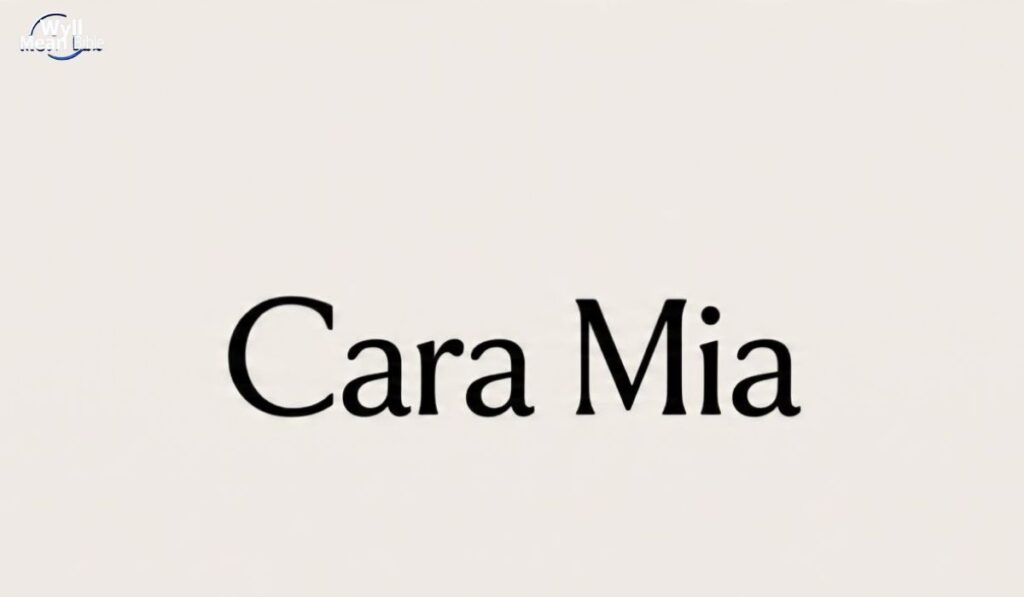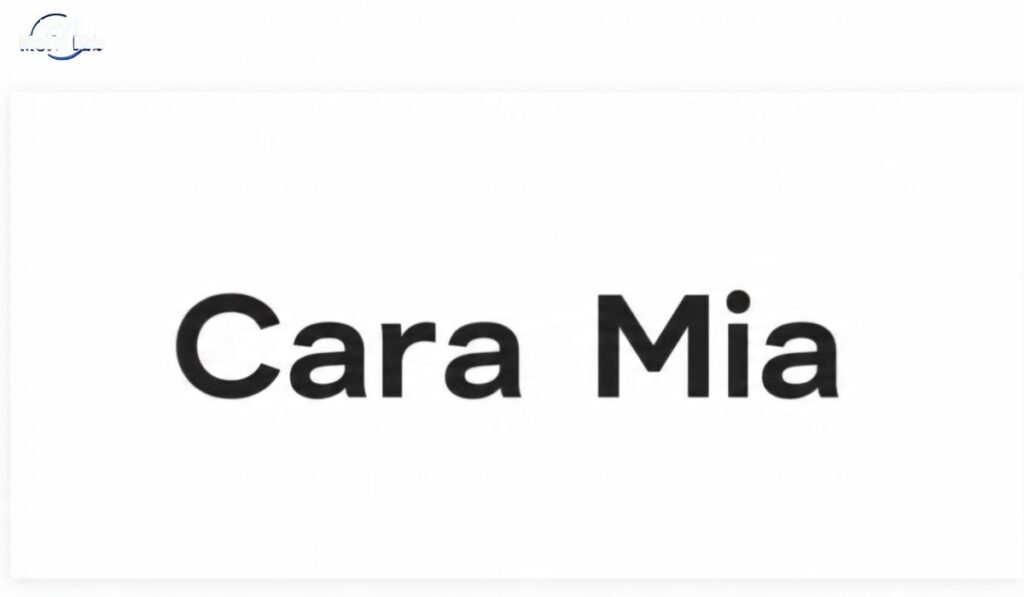“Cara Mia” is a beautiful Italian phrase meaning “my dear” or “my beloved,” often used to express affection and closeness. In 2025, its charm has extended beyond romantic settings, finding a place in polite, professional, and casual conversations as people look for warmer and more expressive ways to connect.
From heartfelt expressions to friendly alternatives, exploring the top 55 meanings and substitutes helps capture the right tone in different contexts, whether you’re addressing a colleague, a friend, or someone special.
Understanding the Meaning of “Cara Mia”
The phrase “Cara Mia” comes from Italian, where “cara” means “dear” and “mia” means “my,” together translating to “my dear” or “my beloved.” It is often used as a term of endearment to express affection, warmth, and closeness toward someone special, whether in a romantic, familial, or friendly context.
Beyond its literal meaning, “Cara Mia” carries a sense of tenderness and emotional connection, making it a phrase that feels timeless and heartfelt.
Formal Alternatives to “Cara Mia”

In formal settings, using refined alternatives to “Cara Mia” can help convey warmth while maintaining professionalism and respect. Expressions like “Dear Colleague,” “Respected Sir/Madam,” or “Esteemed Guest” offer a polished way to address someone without sounding overly casual or intimate.
These alternatives balance courtesy with formality, making them suitable for business emails, official letters, or professional introductions where sincerity and respect are key.
Polite & Professional Expressions:
- Dear [Name] – A classic and universally accepted greeting suitable for letters, emails, or formal notes.
- Esteemed [Name] – Conveys high regard and is often used in academic or business contexts.
- Respected [Name] – Adds a tone of admiration and works well for addressing seniors or mentors.
- My Honored Friend – Warm yet respectful, ideal for professional relationships with a personal touch.
- Cherished Colleague – Shows appreciation while maintaining professionalism in workplace communication.
Examples in Sentences:
- “Dear Maria, I truly appreciate your guidance on this project.”
- “Esteemed Dr. Rossi, I am honored to collaborate with you.”
- “Respected Professor, thank you for your valuable insights.”
- “My Honored Friend, your support means a great deal to me.”
- “Cherished Colleague, I admire your dedication and hard work.”
Casual and Friendly Alternatives
- Hey Love – A relaxed and affectionate greeting often used between close friends or partners.
- Sweetheart – Warm and caring, suitable for both friendships and romantic relationships.
- Darling – Slightly formal yet still cozy, often used in friendly or affectionate tones.
- Babe – A trendy and modern way to show closeness, popular in casual conversations.
- Bestie – Perfect for expressing affection toward a close or lifelong friend.
Examples in Sentences:
- “Hey Love, how was your day?”
- “Sweetheart, let’s grab a coffee later.”
- “Darling, you always know how to cheer me up.”
- “Babe, you’re the best part of my day.”
- “Bestie, we need a fun night out soon!”
Romantic Alternatives to “Cara Mia”

Romantic alternatives to “Cara Mia” are perfect for expressing deep affection and intimacy toward a partner. These phrases carry emotional warmth and can make your words feel more personal, heartfelt, and timeless.
They are ideal for love letters, heartfelt texts, or moments when you want to strengthen your emotional bond.
- My Love – A classic and universally romantic phrase.
- My Dearest – Slightly formal but deeply affectionate.
- My Heart – Conveys emotional closeness and vulnerability.
- My Everything – Expresses complete devotion and importance.
- Beloved – Elegant and poetic, often used in literature and romance
Examples in Sentences:
- “My Love, you are the most important part of my life.”
- “My Dearest, every moment with you feels special.”
- “My Heart, I can’t wait to hold you tonight.”
- “My Everything, you complete me in every way.”
- “Beloved, my world is brighter because of you.”
Cultural Variations of “Cara Mia”

Different cultures have their own beautiful ways of expressing affection similar to “Cara Mia.” These variations not only reflect language but also carry unique cultural warmth, making them perfect for adding a special touch to your conversations or messages.
- French: Ma Chérie – “My Darling,” often used romantically.
- Spanish: Mi Amor – “My Love,” a very common endearment.
- German: Meine Liebe – “My Love,” affectionate yet simple.
- Portuguese: Minha Querida – “My Dear,” warm and heartfelt.
- Japanese: Watashi no Itoshii – “My Beloved,” deeply emotional and poetic.
When to Use “Cara Mia” vs. Its Alternatives
Knowing when to use “Cara Mia” versus its alternatives depends on the tone, setting, and relationship. “Cara Mia” works best in romantic, poetic, or deeply affectionate moments, such as love letters, songs, or intimate conversations.
However, in professional or casual contexts, it may feel too dramatic or overly personal. That’s when alternatives like “Dear [Name]” in formal situations or “Bestie” and “Babe” in friendly or casual chats become more appropriate, ensuring your words match the mood and audience perfectly.
When “Cara Mia” is Appropriate:
- In romantic settings like love letters, poems, or songs.
- When expressing deep affection to a partner or cherished family member.
- During Italian-themed moments or cultural references where the phrase feels natural.
When to Use an Alternative:
- In professional or formal communication where intimacy isn’t suitable.
- In casual conversations with friends to keep the tone light and natural.
- In multilingual or cross-cultural settings where a different expression may resonate better.
Examples for Digital Conversations
- “Hey Love, just wanted to check in on you ❤️”
- “Good morning, my dearest! Wishing you a wonderful day ☀️✨”
- “Sweetheart, I can’t wait to see you tonight 🥰”
- “Dear Anna, thank you for your thoughtful message 🙏💌”
- “Babe, let’s plan something fun this weekend 🎉🍽️”
- “My Heart, you always make me smile 💖😊”
- “Hey Bestie, we seriously need a catch-up session soon 🎶☕”
- “My Love, you mean the world to me 🌍💕”
- “Dear Professor, I truly value your guidance 📚✨”
- “Sweetie, sending you a big virtual hug 🤗💞”
The Influence of “Cara Mia” in Pop Culture
“Cara Mia” has left a lasting imprint on pop culture, often appearing in music, films, and literature as a symbol of romance and timeless affection. Its poetic charm continues to inspire creative works, making it a phrase that transcends generations and cultural boundaries.
- Music: Popularized by songs like “Cara Mia” by Jay & The Americans.
- Television: Gomez Addams famously calls Morticia “Cara Mia” in The Addams Family.
- Literature & Opera: Frequently used in Italian poetry and romantic performances to express deep love.
Choosing the Right Phrase for the Right Context
- Consider Formality – Decide if the situation is professional, casual, or romantic before choosing your words.
- Match Emotional Depth – Use light phrases for friends and heartfelt ones for loved ones.
- Think About Cultural Relevance – A phrase in another language may feel more meaningful in certain contexts.
- Adapt to Digital or In-Person Settings – Keep texts short and warm, while spoken phrases can be more expressive.
- Know Your Relationship – Choose phrases that reflect closeness without crossing personal boundaries.
Conclusion
“Cara Mia” remains a timeless expression of love and tenderness, but in 2025, its versatility shines through the many alternatives that suit different tones and settings. Whether you want to sound polite and professional, casual and friendly, or deeply romantic, there’s a phrase that can perfectly match the moment.
By exploring these 55 options, you can communicate with warmth, respect, and authenticity, ensuring your words carry the right impact no matter the context.

Muhammad Shoaib is an expert writer in Bible meaning, quotes, bible, Prayers, and pick-up lines, known for crafting creative, catchy, and SEO-friendly content that connects and captivates audiences.






